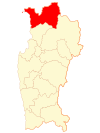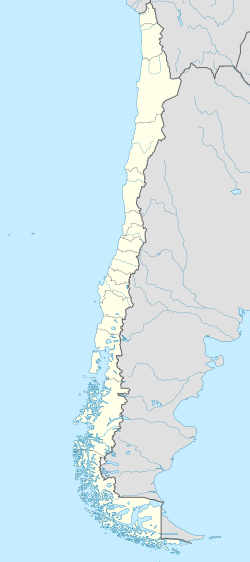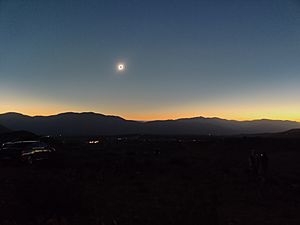La Higuera, Chile facts for kids
Quick facts for kids
La Higuera
|
|||||
|---|---|---|---|---|---|
|
Town and Commune
|
|||||
|
|||||
| Country | |||||
| Region | |||||
| Province | Elqui | ||||
| Capital | La Higuera | ||||
| Government | |||||
| • Type | Municipality | ||||
| Area | |||||
| • Total | 4,158.2 km2 (1,605.5 sq mi) | ||||
| Elevation | 594 m (1,949 ft) | ||||
| Population | |||||
| • Total | 4,285 | ||||
| • Density | 1.03049/km2 (2.6690/sq mi) | ||||
| • Urban | 1,080 | ||||
| • Rural | 2,641 | ||||
| Sex | |||||
| • Men | 2,084 | ||||
| • Women | 1,637 | ||||
| Time zone | UTC-4 (CLT) | ||||
| • Summer (DST) | UTC-3 (CLST) | ||||
| Area code(s) | 56 + 51 | ||||
| Website | Municipality of La Higuera | ||||
La Higuera is a town and a type of local government area called a commune in Chile. It's located in the Elqui Province, within the Coquimbo Region. To its west is the Pacific Ocean. The Atacama Region is to its east. To the south, you'll find the communes of Vicuña and La Serena.
Punta de Choros, a part of La Higuera, is well-known for its beautiful beaches. It's also home to a special group of bottlenose dolphins. This is the southernmost place where these dolphins live. Out of all the people living in La Higuera, about 1,080 live in towns. The rest, about 2,641 people, live in the countryside.
The islands of Choros and Damas are also part of this commune. These islands form the National Reserve of the Humboldt Penguin. This reserve is managed by the Corporación Nacional Forestal. On Damas Island, you can find the beach called La Tijera at its southern end.
Two important places for studying space are also in this commune. These are the Las Campanas Observatory and the La Silla Observatory.
History of La Higuera
The area of La Higuera has always been known for its rich mineral resources. Mining grew a lot between 1855 and 1880. This brought many new people to the area. However, when the minerals ran out, many people left. Today, you can still see piles of mining waste in the northern part of La Higuera town. These piles remind everyone of the mining days.
There are plans to build a modern thermal power station in the commune. This power station would provide energy to the main power grid. It could be more reliable than hydroelectric power during dry times. Even though this project would bring jobs and money, some people are against it. They worry about the possible harm to the environment.
Another big problem for the commune is the lack of clean potable water. This is due to many reasons. People have complained to both local and regional governments about it. In the 1990s, a special project was set up on El Tofo mountain. It used fog collection to get water for the village of Chugungo. By 2002, this project was not working well. Water had to be brought to the village by trucks. People have asked for a water pipeline to be built.
Population and Communities
According to the 2002 census by the National Statistics Institute, La Higuera had 3,721 residents. This included 2,084 men and 1,637 women. About 1,080 people (29%) lived in urban areas. The remaining 2,641 people (71%) lived in rural areas. The population grew by 6.4% between 1992 and 2002.
The people of La Higuera live in several different villages. These villages are spread out across the commune. The main villages include Caleta Los Hornos, Chungungo, La Higuera (which is the main town), El Trapiche, Punta Colorada, Los Choros, and Punta de Choros.
On July 2, 2019, the town of La Higuera was in the path of a total solar eclipse. You can see a photo of this amazing event.
Local Government
As a commune, La Higuera is a local administrative division of Chile. It is managed by a municipal council. The council is led by an alcalde, which is like a mayor. The alcalde is chosen directly by the people every four years. Sylvia Clavería Mondaca was the alcalde from 2008 to 2012.
See also
 In Spanish: La Higuera (Chile) para niños
In Spanish: La Higuera (Chile) para niños
 | Jackie Robinson |
 | Jack Johnson |
 | Althea Gibson |
 | Arthur Ashe |
 | Muhammad Ali |





